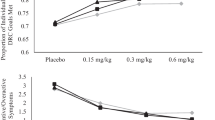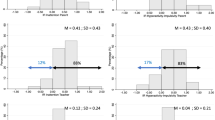Abstract
Objective
The additional value of a short-term, clinically based, intensive multimodal behavior therapy to optimally titrated methylphenidate in children with attention-deficit hyperactivity disorder (ADHD) was investigated.
Method
Fifty children with ADHD (ages 8–12) were randomized to treatment of methylphenidate or treatment with methylphenidate combined with 10 weeks of multimodal behavior therapy. The multimodal behavior therapy consisted of a child and parent behavioral therapy and a teacher behavioral training. Assessments included parent, teacher and child ratings of ADHD symptoms, oppositional and conduct behavior, social skills, parenting stress, anxiety and self-worth.
Results
Both treatment conditions yielded significant improvements on all outcome domains. No significant differences were found between both treatments.
Conclusions
No evidence was found for the additive effect of multimodal behavior therapy next to optimally titrated methylphenidate.
Clinical implications
This study does not support the expectation that optimally dosed stimulant treated children with ADHD should routinely receive psychosocial treatment to further reduce ADHD- and related symptoms.

Similar content being viewed by others
References
Abidin RR (1983) Parenting stress index: manual. Pediatric Psychology Press, Charlottesville
Abikoff H, Hechtman L, Klein RG, Weiss G, Fleiss K, Etcovitch J, Cousins L, Greenfield B, Martin D, Pollack S (2004a) Symptomatic improvement in children with ADHD treated with long-term methylphenidate and multimodal psychosocial treatment. J Am Acad Child Adolescent Psychiatr 43:802–811
Abikoff H, Hechtman L, Klein RG, Gallagher R, Fleiss K, Etcovitch J, Cousins L, Greenfield B, Martin D, Pollack S (2004b) Social functioning in children with ADHD treated with long-term methylphenidate and multimodal psychosocial treatment. J Am Acad Child Adolescent Psychiatr 43:820–829
American Psychiatric Association (1994) Diagnostic and statistical manual of mental disorders, 4th edition (DSM-IV). American Psychiatric Association, Washington, DC
Arnold LE, Chuang S, Davies M, Abikoff HB, Conners CK, Elliot GR, Greenhill LL, Hechtman L, Hinshaw SP, Hoza B, Jensen PS, Kraemer HC, Langworthy-Lam KS, March JS, Newcorn JH, Pelham EE, Severe JB, Swanson JM, Vitiello B, Wells KC, Wigal T (2004) Nine months of multicomponent behavioral treatment for ADHD and effectiveness of MTA fading procedures. J Abnormal Child Psychol 32:39–51
August GJ, Realmuto GM, MacDonald III AW, Nugent SM, Crosby R (1996) Prevalence of ADHD and comorbid disorders among elementary school children screened for disruptive behavior. J Abnormal Child Psychol 24:571–595
Bakker FC, Van Wieringen PCW, Van der Ploeg HM, Spielberger CD (1989) Handleiding bij de Zelf-Beoordelings-Vragenlijst voor Kinderen [Manual for the self-evaluation questionnaire for children]. Swets & Zeitlinger, Lisse, the Netherlands
Barkley RA (1987) Defiant children: a clinicians’ manual for parent training. Guilford Press, New York
Boyle MH, Jadad AR, Phil ARJ (1999) Lessons from large-scale trials: the MTA study as a model for evaluating the treatment of childhood psychiatric disorder. Can J Psychiatr 44:991–998
Cohen J (1988) Statistical power analysis for the behavioural sciences (2nd ed.). Academic, New York
Conners CK, Epstein JN, March JS, Angold A, Wells KC, Klaric J, Swanson JM, Arnold LE, Abikoff HB, Elliot GR, Greenhill LL, Hechtman L, Hinshaw SP, Hoza B, Jensen PS, Kraemer HC, Newcorn JH, Pelham WR, Severe JB, Vitiello B, Wigal T (2001) Multimodal treatment of ADHD in the MTA: an alternative outcome analysis. J Am Acad Child Adolescent Psychiatr 40(2):159–167
De Brock AJLL, Gerris JRM, Vermulst AA (1992) Nosi, Nijmeegse Ouderlijke Stress Index [Parenting stress index: manual]. Swets en Zeitlinger, Lisse
Ferdinand RF, van der Ende J, Mesman J (1998) Diagnostic Interview Schedule for Children, DISC-IV. Nederlandse vertaling [Dutch translation]. Sophia Kinderziekenhuis, Rotterdam (Unpublished manuscript)
Greene RW, Ablon JS (2001) What does the MTA Study tell us about effective psychosocial treatment for ADHD? J Clin Child Psychol 30:114–121
Greenhill LL, Abikoff HB, Arnold E, Cantwell DP, Conners CK, Elliot G, Hechtman L, Hinshaw SP, Hoza B, Jensen PS, March J, Newcorn J, Pelham WE, Severe JB, Swanson JM, Vitiello B, Wells K (1996) Medication treatment strategies in the MTA study: relevance to clinicians and researchers. J Am Acad Child Adolescent Psychiatr 34:1–9
Greenhill LL, Halperin JM, Abikoff H (1999) Stimulant medications. J Am Acad Child Adolescent Psychiatr 38:503–512
Gresham FM, Elliot SN (1990) Social skills rating system manual. American Guidance Service, Circle Pines, MN
Groth-Marnat G (1997) Handbook of psychological assessment (3rd ed.). John Wiley And Sons, New York
Harter S (1985) Manual for the self-perception profile for children. University of Denver, Denver
Hechtman L, Abikoff H, Klein RG, Greenfield B, Etcovitch J, Cousisns L, Fleiss K, Weiss M, Pollack S (2004) Children with ADHD treated with long term methylphenidate and multimodal psychosocial treatment: impact on parenting practices. J Am Acad Child Adolescent Psychiatr 43:830–838
Hinshaw SP, Owens EB, Wells K, Kraemer HC, Abikoff HB, Arnold LE, Conners CK, Elliot G, Greenhill LL, Hechtman L, Hoza B, Jensen PS, March JS, Newcorn JH, Pelham WE, Swanson JM, Vitiello B, Wigal T (2000) Family processes and treatment outcome in the MTA: negative/ineffective parenting practices in relation to multimodal treatment. J Abnormal Child Psychol 28:555–568
Horn WF, Ialongo NS, Pascoe JM, Greenberg G, Packard T, Lopez M, Wagner A, Puttler L (1991) Additive effects of psychostimulants, parent training, and self-control therapy with ADHD children. J Am Acad Child Adolescent Psychiatr 30:233–240
Hoza B, Owens JS, Pelham WE, Swanson JM, Conners CK, Hinshaw SP, Arnold LE, Kraemer HC (2000) Parent cognitions as predictors of child treatment response in attention-deficit/hyperactivity disorder. J Abnormal Child Psychol 28:569–583
Hoza B, Gerdes AC, Hinshaw SP, Arnold LE, Pelham WE, Molina BS, Abikoff HB, Epstein JN, Greenhill LL, Hechtman L, Odbert C, Swanson JM, Wigal T (2004) Self-perceptions of competence in children with ADHD and comparison children. J Consult Clin Psychol 72:382–391
Johnston C, Mash EJ (2001) Families of children with attention-deficit/hyperactivity disorder: review and recommendations for future research. Clin Child Family Psychol Rev 4:183–207
Kendall PC, Braswell L (1993) Cognitive-behavioral therapy for impulsive children, second edition. The Guilford Press, New York/London
Klein RG, Abikoff H (1997) Behavior therapy and methylphenidate in the treatment of children with ADHD. J Attention Disorders 2:89–114
Klein RG, Abikoff H, Hechtman L, Weiss G (2004) Design and rationale of controlled study of long-term methylphenidate and multimodal psychosocial treatment in children with ADHD. J Am Acad Child Adolescent Psychiatr 43:792–801
Loney J, Milich R (1982) Hyperactivity, inattention and aggression in clinical practice. Adv Develop Behav Pediatr 3:113–147
March JS, Swanson JM, Arnold LE, Hoza B, Conners KC, Hinshaw SP, Hechtman L, Kraemer HC, Greenhill LL, Abikoff HB, Elliot LG, Jensen PS, Newcorn JH, Vitiello B, Severe J, Wells KC, Pelham WE (2000) Anxiety as a predictor and outcome variable in the multimodal treatment study of children with ADHD. J Abnormal Child Psychol 28:527–541
MTA Cooperative Group (1999a) A 14-month randomized clinical trail of treatment strategies for Attention Deficit Hyperactivity Disorder. Archiv Gen Psychiatr 56:1073–1086
MTA Cooperative Group (1999b) Moderators and mediators of treatment response for children with attention-deficit/hyperactivity disorder. Archiv Gen Psychiatr 56:1088–1097
MTA Cooperative Group (2004a) National Institute of Mental Health Multimodal Treatment Study of ADHD follow-up: 24-month outcomes of treatment strategies for attention-deficit/hyperactivity disorder. Pediatrics 113:754–761
Oosterlaan J, Scheres A, Antrop I, Roeyers H, Sergeant JA (2000) Handleiding bij de vragenlijst voor gedragsproblemen bij kinderen [Manual of the rating scale for disruptive behavior disorders in children – DBDRS]. Harcourt, Lisse, the Netherlands
Pelham WE (1997) Attention deficit hyperactivity disorder: diagnosis, nature, etiology, and treatment. State University of New York at Buffalo, Buffalo
Pelham WE (1999) The NIMH multi modal treatment study for ADHD: just say yes to drugs alone? Can J Psychiatr 44:981–990
Pelham WEG, Gnagny EM, Greenslade KE, Milich R (1992) Teacher ratings of DSM-III-R symptoms for disruptive behaviour disorder. J Am Acad Child Adolescent Psychiatr 31:210–218
Shaffer D, Fisher P, Lucas CP, Dulcan MK, Schwab-Stone ME (2000) NIMH diagnostic interview schedule for children version IV (NIMH DISC-IV): description, differences from previous versions and reliability of some common diagnoses. J Am Acad Child Adolescent Psychiatr 39:28–38
Spielberger CD, Edwards CD, Lushene RE, Montuori J, Platzek D (1973) The state-trait anxiety inventory for children (preliminary manual). Consulting Psychologists, Palo Alto, CA
Schwab-Stone ME, Shaffer D, Dulcan MK, Jensen PS, Fisher P, Bird HR, Goodman SH, Lahey BB, Lichtman JH, Canino G, Rubio-Stipec M, Rae DS (1996) Criterion validity of the NIMH diagnostic interview schedule for children version 2.3. (DISC-2.3). J Am Acad Child Adolescent Psychiatr 35:878–888
Swanson J (1990) School-based assessment inventories for ADD students. KC Publishing, Miami
Treuting JJ, Hinshaw SP (2001) Depression and self-esteem in boys with attention/deficit hyperactivity disorder: associations with comorbid aggression and explanatory attributional mechanisms. J Abnormal Child Psychol 29:23–39
Veerman JW, Straathof MAE, Treffers PDA, Van den Brink BRH, Ten Brink LT (1997) Competentiebelevingsschaal voor kinderen, handleiding [Manual self-perception profile for children]. Harcourt, Lisse, the Netherlands
Van der Oord S, Van der Meulen EM, Prins PJM, Oosterlaan J, Buitelaar JK, Emmelkamp PMG (2005) A psychometric evaluation of the social skills rating system in children with attention deficit hyperactivity disorder. Behav Res Therap 43:733–746
Wechsler D (1974) Wechsler intelligence scale for children-revised manual. Psychological Corporation, New York
Wells KC, Epstein JN, Hinshaw SP, Conners CK, Klaric J, Abikoff HB, Abramowitz A, Arnold LE, Elliot G, Greenhill LL, Hechtman L, Hoza B, Jensen PS, March JS, Pelham W, Pfiffner L, Severer J, Swanson JM, Vitiello B, Wigal T (2000) Parenting and family stress treatment outcomes in Attention Deficit Hyperactivity Disorder (ADHD): an empirical analysis in the MTA study. J Abnormal Child Psychol 28:543–553
Author information
Authors and Affiliations
Corresponding author
Rights and permissions
About this article
Cite this article
van der Oord, S., Prins, P.J., Oosterlaan, J. et al. Does brief, clinically based, intensive multimodal behavior therapy enhance the effects of methylphenidate in children with ADHD?. Eur Child Adolesc Psychiatry 16, 48–57 (2007). https://doi.org/10.1007/s00787-006-0574-z
Accepted:
Published:
Issue Date:
DOI: https://doi.org/10.1007/s00787-006-0574-z




